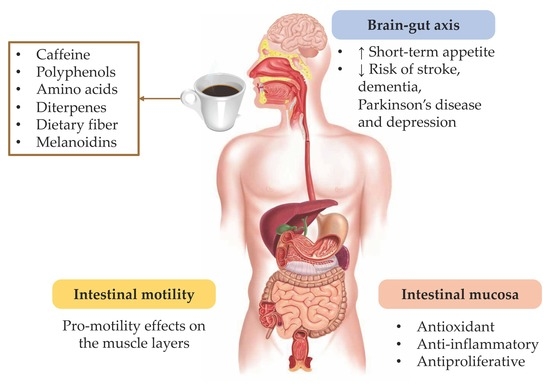
History and use authorH. 3 Based on the data reviewed it can be concluded that moderate caffeine intake 23 cups or 300 mgday is not associated with adverse effects such as cardiovascular stimulatory effects and behavioral changes at least in healthy adults.
The test rats were placed on different concentrations of caffeine for twenty-eight 28 days.
Biological effects of caffeine. Based on a paper presented during the IFT Toxicology and Safety Evaluation Division program Caffeine–Biological Effects at the 43rd Annual Meeting of the Institute of Food Technologists New Orleans La June 19-22 1983. Skeletal and muscular systems. Caffeine in large amounts may interfere with absorption and metabolism of calcium.
This can contribute to bone thinning. Caffeine–the drug that gives coffee and cola its kick–has a number of physiological effects. At the cellular level caffeine blocks the action of a chemical called phosphodiesterase PDE.
Caffeine was able to increase insulin and serum glycemia levels after oral glucose tolerance test OGTT demonstrating that caffeine alters blood glucose maintenance in diabetic men. Caffeine is being shown to be related with the regulation of glucose and lipid metabolism in skeletal muscle. Studies observed that caffeine may increase the concentration of different glucose carriers GLUT such as GLUT2 and GLUT4 Canto et al 2006.
Wright et al 2005. Park et al 2009. Caffeine stimulates the central nervous system CNS heightening alertness and sometimes causing restlessness and agitation.
It relaxes smooth muscle stimulates the contraction of cardiac muscle and enhances athletic performance. Caffeine promotes gastric acid. 6Caffeine Effects on the Central Nervous System and Behavioral Effects Associated with Caffeine Consumption.
In addition to its potential impact on cardiac health public health experts areconcerned about the effect of high levels of caffeine exposure on the centralnervous system and behavior. Growth pregnancy spontaneous abortion tea. Caffeine 137-trimethylxanthine is a natural alka-.
Loid found in coffee beans tea leaves cocoa beans cola nuts and other plants. Coffee and caffeine-containing products affect the cardiovascular system with their positive inotropic and chronotropic effects and the central nervous system with their locomotor activity stimulation and anxiogenic-like effects. The positive effects that caffeine has on mental alertness are related to caffeines ability to raise levels of dopamine which is linked to concentration levels.
Other studies indicate that caffeine can help preserve the memory skills of older adults. Regular consumption of 100 mg caffeine per day can result in chemical dependence. The effects of caffeine on learning memory performance and coordination are rather related to the methylxanthine action on arousal vigilance and fatigue.
Caffeine exerts obvious effects on anxiety and sleep which vary according to individual sensitivity to the methylxanthine. Most of the biological actions of caffeine are possibly mediated through its antagonistic effects to adenosine. Adenosine activates an inhibitory GTP-binding protein Gi.
One of the physiological actions of Gi is the inhibition of cAMP formation. Caffeine overcomes this action thus leading to elevation of cAMP. Biological effects of caffeine.
History and use inproceedingsRoberts1983BiologicalEO titleBiological effects of caffeine. History and use authorH. Barone year1983 H.
Biological activities of caffeine include immunomodulatory activity central nervous system stimulatory activity antimicrobial anticancer and antioxidant activity. Ghaleb Adwan and Mohammad Mhanna 2008 Caffeine is known to exhibits various biological functions. Some of the reported action of caffeine includes inhibition of.
Caffeine can block the effects of the hormone adenosine which is responsible for deep sleep. Caffeine binds to adenosine receptors in the brain which not only lowers adenosine levels but also increases or decreases other hormones that affect sleep including dopamine serotonin norepinephrine and. - Caffeine particularly in doses of 300mg 3 cups of coffee or more per day can result in both male and female infertility.
- In animal tests high caffeine consumption was associated in poor pregnancy outcome. Spontaneous abortion congenital malformations fetal growth retardation and residual effects in. Stimulation of the CNS might be caffeines most significant biological effect which is typically described as arousal and alertness feelings after coffee consumption.
Caffeine has been shown to induce beneficial effects on human behavior which were not described by the intake of decaffeinated drinks 17. Breaking Down the Buzz. Caffeine has a perk-up effect because it blocks a brain chemical adenosine which causes sleepiness.
On its own moderate amounts of caffeine rarely cause harmful long-term health effects although it is definitely possible to take too much caffeine and get sick as. In addition the physiological effects of caffeine intake include acute elevation of blood pressure increasing metabolic rate and diuresis. 3 Based on the data reviewed it can be concluded that moderate caffeine intake 23 cups or 300 mgday is not associated with adverse effects such as cardiovascular stimulatory effects and behavioral changes at least in healthy adults.
Effect of caffeine on some selected biochemical parameters using rat model was investigated. Standard methods of analysis were used for the study. A total of sixty 60 rats divided equally into five groups of which one group served as the control and the rest as test groups were used.
The test rats were placed on different concentrations of caffeine for twenty-eight 28 days. Caffeine tends to have a more beneficial effect on habitual consumers moods compared to non-consumers but there are greater improvements in performance when drunk by non-consumers 9. It also seems that mood is not only modulated by caffeine itself but also by the expectation of having consumed caffeine which improves mood together with.
Caffeines effects will last for several hours depending on how quickly or slowly it is metabolised by the body 7. Caffeine absorption from food and beverages does not seem to depend on age gender genetic background and disease or drugs alcohol and nicotine consumption. Caffeine absorption from tea and coffee is similar 18.